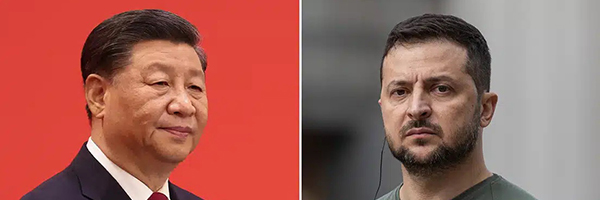Xi Jinping Speaks with Zelensky About China’s Peace Plan for Ukraine
 Orinoco Tribune, April 27, 2023 —
Orinoco Tribune, April 27, 2023 —
The president of China, Xi Jinping, and his Ukrainian counterpart, Volodymyr Zelensky, held their first contact since the beginning of the conflict between Ukraine and Russia in February 2022, as reported by the Chinese Foreign Ministry. The telephone call was made at the initiative of the Ukrainian side, held this Wednesday, April 26.
Xi reiterated that dialogue and negotiations are the way to end the conflict with Russia. He also emphasised that no one will win if a nuclear conflict breaks out, reiterating China’s stance against attacking nuclear facilities, as well as the use or threat of atomic weapons.
The Chinese government will send its special representative for Eurasian Affairs, Li Hui, to Ukraine and a number of other nations, in order to hold in-depth talks with all parties on the political settlement of the armed conflict.
Zelensky noted that his conversation with President Xi was “long and significant,” and expressed the hope that, together with the appointment of Ukraine’s ambassador to China, it would “give a strong impetus to the development” of bilateral relations between the two countries. The Ukrainian president appointed the former minister of strategic industries, Pavlo Riabikin, to serve as the new Ukrainian ambassador to China.
“China will continue to facilitate peace talks, and strive to achieve an upcoming ceasefire and the restoration of peace,” the Chinese foreign ministry stated, communicating the words of President Xi.
“China did not create the Ukrainian crisis, nor is it a party to it,” the Asian nation further added in a statement. “As a permanent member of the UN Security Council and a responsible country of importance, China will not remain impassive, nor will it add fuel to the fire, much less will it exploit the situation for its own benefit.”
After speaking with Xi Jinping, Zelensky stated via social media that peace in the conflict with Moscow “will not be achieved at the cost of territorial commitments.”
The spokeswoman for the Russian Foreign Ministry, Maria Zakharova, commented on the conversation between Presidents Xi and Zelensky, noting Beijing’s willingness to “make an effort to facilitate the negotiation process,” further commenting that “the problem lies not in the lack of good plans, but in Kyiv’s rejection of any sensible initiative aimed at a political and diplomatic solution to the Ukrainian crisis.”
Zakharova said that the Ukrainian government “conditions its eventual consent to the negotiations to ultimatums with unrealistic demands from the beginning.” She also recalled that Zelensky “legally prohibited any negotiations with the president of Russia, Vladimir Putin,” adding that “any calls for peace can hardly be properly received by the puppets controlled from Washington.”
Chinese peace plan
Beijing has always opted to sit Kyiv and Moscow at the negotiating table and support any initiative leading to peace. Last month, China announced it was sending €200,000 to the International Atomic Energy Agency in order to help protect nuclear power plants in Ukraine, in particular the Zaporizhzhya plant, one of the largest nuclear power plants in Europe.
In January, China issued a 12-point document regarding its position on the war in Ukraine, insisting that the international community foster the conditions to resume talks and find a peaceful solution to the conflict. The document vindicated talks as the only viable solution to the crisis, opposed the Cold War mentality, demanded an end to hostilities, and emphasised a necessity for the respect of the sovereignty of all nations.
It also urged those involved to remain rational and exercise restraint, refrain from fanning the flames of war and aggravating tensions, as well as prevent the situation from escalating out of control. “All parties should support Russia and Ukraine to work in the same direction and resume direct dialogue as soon as possible,” read the official text, “in order to gradually de-escalate the situation and ultimately reach a comprehensive ceasefire.”
China considered it vital to promote and channel any measure to alleviate the humanitarian crisis, while calling on Moscow and Kyiv not to attack civilian buildings, as well as to protect women, children, and other victims of the conflict, and to respect the fundamental rights of prisoners of war.
Likewise, Beijing called for reducing risks, guaranteeing stability for industrial supply chains, facilitating grain exports, ceasing the imposition of unilateral sanctions, and making way for the reconstruction of devastated areas.
“The international community must remain committed to the correct approach of promoting peace talks and helping the parties to the conflict to open the door to a political solution to the crisis as soon as possible,” reads China’s peace proposal. “China will continue to play a constructive role in this regard.”
